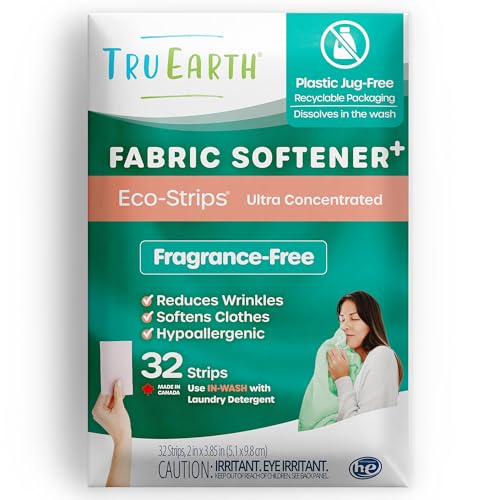
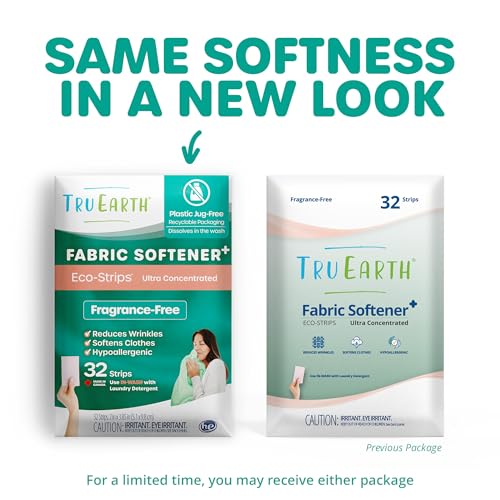
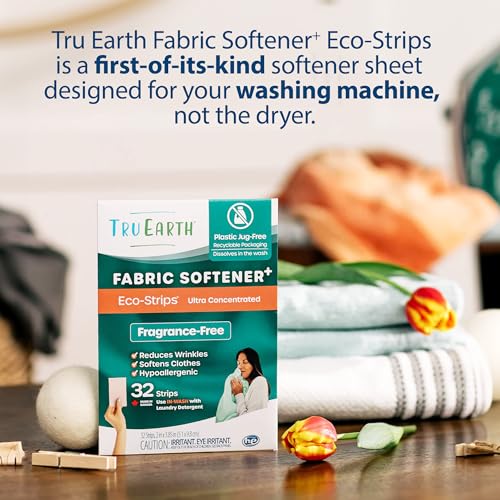
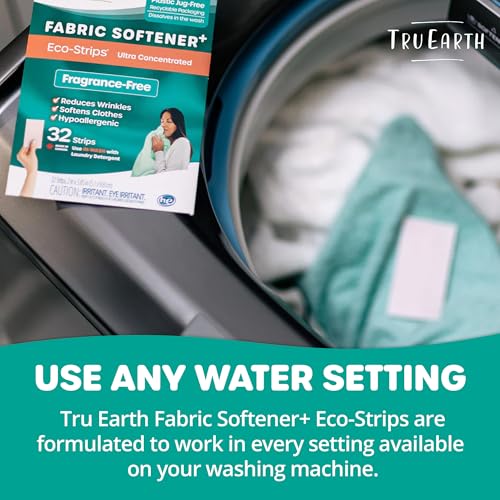
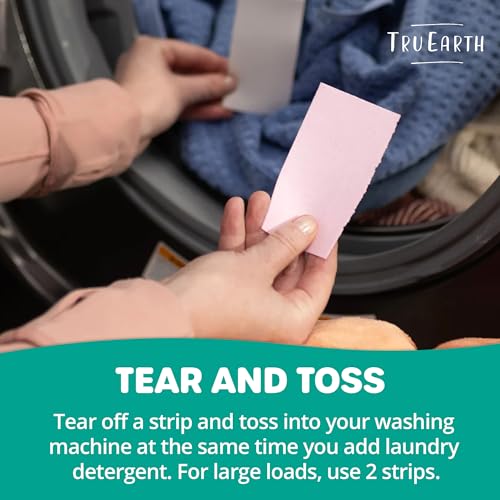
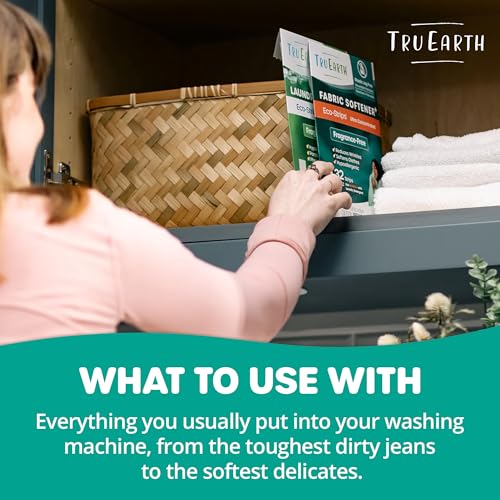
Tru Earth Fabric Softener Strips - Ultra-Concentrated, Paraben-Free, Unscented - 32 Count


Potassium Sorbate
Medium RiskPotassium sorbate is a potassium salt of sorbic acid, primarily used as a preservative in food and cosmetic products. It inhibits the growth of molds, yeast, and some bacteria, extending the shelf life of products. It is commonly found in various formulations due to its effectiveness and low toxicity.
Sustai Insights
Potassium sorbate serves as an effective preservative, preventing microbial growth in food and cosmetic products, which is vital for safety and longevity. Although it has a low risk of carcinogenicity and developmental toxicity, there is a moderate concern regarding allergies and immunotoxicity. Environmentally, it poses minimal risks as it is not significantly bioaccumulative. Regulatory agencies have verified its use, although some products may face restrictions. Overall, it is assessed as a medium risk ingredient, with safe usage practices recommended, and alternatives such as natural preservatives could be considered.
Vegetarian Glycerin
Low RiskVegetarian glycerin, also known as glycerol, is a colorless, odorless, and viscous liquid derived from plant sources. It is primarily used as a humectant, solvent, and emollient in various personal care products, helping to retain moisture and improve texture.
Sustai Insights
Vegetarian glycerin offers functional benefits as an effective humectant, promoting hydration and skin smoothness. It is biodegradable and typically sustainably sourced. Health risks associated with glycerin are low, with no significant concerns for carcinogenicity, allergens, or reproductive toxicity. Environmental risks are minimal, and it is not subject to major regulatory warnings. Overall, the risk level for this ingredient is low, making it a safe choice in formulations. Safe usage practices include ensuring proper concentrations in products, and alternatives such as propylene glycol exist but may have differing properties.
Polyglyceryl 2 Caprate
Low RiskPolyglyceryl-2 caprate is an ester derived from capric acid and polyglycerin-2, primarily used as an emulsifier in cosmetic formulations. It helps to blend oil and water-based ingredients, enhancing product texture and stability. This ingredient is recognized for its multifunctional properties in various personal care products.
Sustai Insights
Polyglyceryl-2 caprate offers functional benefits as an effective emulsifier, contributing to product stability and texture. It is considered to have low health risks, with minimal concerns regarding carcinogenicity, allergies, and irritation. Environmentally, it is not identified as a pollutant or bioaccumulative. Regulatory agencies do not impose significant restrictions on its use. Overall, the ingredient is assessed as low risk, making it a safe choice in cosmetic formulations with no significant adverse effects.
Polyquaternium 22
Low RiskPolyquaternium-22 is a synthetic polymer commonly used in cosmetic formulations as a conditioning agent and film-former. It enhances the texture and feel of products, providing a smooth finish and improved manageability for hair and skin applications.
Sustai Insights
Polyquaternium-22 offers functional benefits as a hair and skin conditioning agent, contributing to improved product performance. It is considered to have low health risks, with no significant concerns regarding carcinogenicity or allergies, and it is not restricted by regulatory bodies. Environmental assessments indicate minimal risks, as it does not bioaccumulate. Overall, it is assessed as low risk, making it a suitable option in cosmetic formulations. Safe usage practices should be followed, and while alternatives exist, this ingredient is regarded as effective in its role.
Zea Mays (Corn) Starch
Low RiskZea mays (corn) starch is a starch obtained from corn kernels, primarily used as a thickening and stabilizing agent in various cosmetic and food products. It serves as a binder and enhances texture, contributing to the overall formulation's consistency and stability.
Sustai Insights
Zea mays (corn) starch offers functional benefits such as acting as a thickening and stabilizing agent, which helps improve product texture. It is sustainably sourced and biodegradable, posing low health risks, including negligible concerns for carcinogenicity and allergies. Environmental risks are minimal, with no significant pollutant potential noted. Regulatory bodies have not issued advisories, indicating a low overall risk level. Safe usage practices involve ensuring appropriate concentrations in formulations. Alternatives include other plant-based starches or thickeners, which may offer similar functional benefits while maintaining sustainability.
Water
Low RiskWater is a clear, colorless liquid essential for various biological processes. It serves as a solvent in formulations, facilitating the dissolution of other ingredients and enhancing product texture and application. Additionally, water plays a crucial role in hydration and is a key component in many cosmetic and personal care products.
Sustai Insights
Water is an effective solvent and hydrator, contributing to the texture and efficacy of formulations. It is biodegradable and generally regarded as safe, with low concerns regarding carcinogenicity, allergies, and reproductive toxicity. However, excessive water usage can lead to environmental concerns, particularly regarding resource depletion. Regulatory bodies do not impose restrictions on water use in cosmetics. Overall, the risks associated with water are low, making it a safe and essential ingredient.
Carboxylmethylcellulose Sodium
Low RiskCarboxymethylcellulose sodium is a sodium salt derived from cellulose, commonly used as a thickener, stabilizer, or emulsifier in various products. It is soluble in water and forms a gel-like consistency, making it effective in food, cosmetics, and pharmaceutical formulations.
Sustai Insights
Carboxymethylcellulose sodium offers functional benefits as a thickening agent and stabilizer, contributing to product texture and consistency. It is generally recognized as safe, with low health risks, including no significant concerns for carcinogenicity or allergies. Environmentally, it poses minimal risks, with no bioaccumulation noted. Regulatory bodies do not impose restrictions on its use, affirming its safety. Overall, the risk level is assessed as low, making it a viable option for formulation. Safe usage practices should be observed, and alternatives like guar gum may be considered for those seeking plant-based options.
Polyvinyl Alcohol
Low RiskPolyvinyl alcohol is a synthetic polymer used in various applications, including adhesives, coatings, and as a film-forming agent in personal care products. It is known for its water-solubility and ability to create protective films.
Sustai Insights
Polyvinyl alcohol offers functional benefits as an effective film-former and emulsifier, and it is considered to have low health risks, with no significant concerns regarding carcinogenicity, allergies, or reproductive toxicity. Environmentally, it does not bioaccumulate and has low pollutant potential. Regulatory bodies have not imposed severe restrictions on its use. Despite its beneficial attributes, it is advisable to follow safe usage practices, particularly for sensitive populations. Overall, polyvinyl alcohol is assessed as low risk.
C14 16 Olefin Sulfonate
Low RiskC14-16 Olefin Sulfonate is a surfactant primarily used in personal care products for its cleansing and foaming properties. It is derived from olefins, which are hydrocarbons, and functions effectively in formulations requiring emulsification and dirt removal.
Sustai Insights
C14-16 Olefin Sulfonate serves as an effective surfactant and cleansing agent in various products, with low concerns regarding carcinogenicity, allergies, or reproductive toxicity. It is not currently subject to any use restrictions and is generally considered safe. Environmental risks are minimal, with low potential for pollution or bioaccumulation. Regulatory bodies do not issue significant warnings against its use. Overall, the risk level associated with C14-16 Olefin Sulfonate is low, making it a favorable option in formulations.
Sodium Lauryl Sarcosinate
Low RiskSodium lauryl sarcosinate is a surfactant commonly used in personal care products for its cleansing and foaming properties. It is derived from sarcosine, an amino acid, and is often employed in formulations such as shampoos, body washes, and facial cleansers.
Sustai Insights
Sodium lauryl sarcosinate functions effectively as a mild surfactant, contributing to cleansing and foaming in personal care products. It is biodegradable and may have a lower environmental impact compared to traditional sulfates. Health risks are generally low, with minimal concerns regarding carcinogenicity, allergies, or reproductive toxicity. Regulatory bodies do not impose significant restrictions on its use. Overall, sodium lauryl sarcosinate presents a low risk for consumer health and environmental impact, making it a favorable choice in formulations.
Vegetarian Glycerin
Low RiskVegetarian glycerin, also known as glycerol, is a colorless, odorless, and viscous liquid derived from plant sources. It is primarily used as a humectant, solvent, and emollient in various personal care products, helping to retain moisture and improve texture.
Sustai Insights
Vegetarian glycerin offers functional benefits as an effective humectant, promoting hydration and skin smoothness. It is biodegradable and typically sustainably sourced. Health risks associated with glycerin are low, with no significant concerns for carcinogenicity, allergens, or reproductive toxicity. Environmental risks are minimal, and it is not subject to major regulatory warnings. Overall, the risk level for this ingredient is low, making it a safe choice in formulations. Safe usage practices include ensuring proper concentrations in products, and alternatives such as propylene glycol exist but may have differing properties.
Polyglyceryl 2 Caprate
Low RiskPolyglyceryl-2 caprate is an ester derived from capric acid and polyglycerin-2, primarily used as an emulsifier in cosmetic formulations. It helps to blend oil and water-based ingredients, enhancing product texture and stability. This ingredient is recognized for its multifunctional properties in various personal care products.
Sustai Insights
Polyglyceryl-2 caprate offers functional benefits as an effective emulsifier, contributing to product stability and texture. It is considered to have low health risks, with minimal concerns regarding carcinogenicity, allergies, and irritation. Environmentally, it is not identified as a pollutant or bioaccumulative. Regulatory agencies do not impose significant restrictions on its use. Overall, the ingredient is assessed as low risk, making it a safe choice in cosmetic formulations with no significant adverse effects.
Polyquaternium 22
Low RiskPolyquaternium-22 is a synthetic polymer commonly used in cosmetic formulations as a conditioning agent and film-former. It enhances the texture and feel of products, providing a smooth finish and improved manageability for hair and skin applications.
Sustai Insights
Polyquaternium-22 offers functional benefits as a hair and skin conditioning agent, contributing to improved product performance. It is considered to have low health risks, with no significant concerns regarding carcinogenicity or allergies, and it is not restricted by regulatory bodies. Environmental assessments indicate minimal risks, as it does not bioaccumulate. Overall, it is assessed as low risk, making it a suitable option in cosmetic formulations. Safe usage practices should be followed, and while alternatives exist, this ingredient is regarded as effective in its role.
Zea Mays (Corn) Starch
Low RiskZea mays (corn) starch is a starch obtained from corn kernels, primarily used as a thickening and stabilizing agent in various cosmetic and food products. It serves as a binder and enhances texture, contributing to the overall formulation's consistency and stability.
Sustai Insights
Zea mays (corn) starch offers functional benefits such as acting as a thickening and stabilizing agent, which helps improve product texture. It is sustainably sourced and biodegradable, posing low health risks, including negligible concerns for carcinogenicity and allergies. Environmental risks are minimal, with no significant pollutant potential noted. Regulatory bodies have not issued advisories, indicating a low overall risk level. Safe usage practices involve ensuring appropriate concentrations in formulations. Alternatives include other plant-based starches or thickeners, which may offer similar functional benefits while maintaining sustainability.
Potassium Sorbate
Medium RiskPotassium sorbate is a potassium salt of sorbic acid, primarily used as a preservative in food and cosmetic products. It inhibits the growth of molds, yeast, and some bacteria, extending the shelf life of products. It is commonly found in various formulations due to its effectiveness and low toxicity.
Sustai Insights
Potassium sorbate serves as an effective preservative, preventing microbial growth in food and cosmetic products, which is vital for safety and longevity. Although it has a low risk of carcinogenicity and developmental toxicity, there is a moderate concern regarding allergies and immunotoxicity. Environmentally, it poses minimal risks as it is not significantly bioaccumulative. Regulatory agencies have verified its use, although some products may face restrictions. Overall, it is assessed as a medium risk ingredient, with safe usage practices recommended, and alternatives such as natural preservatives could be considered.
Water
Low RiskWater is a clear, colorless liquid essential for various biological processes. It serves as a solvent in formulations, facilitating the dissolution of other ingredients and enhancing product texture and application. Additionally, water plays a crucial role in hydration and is a key component in many cosmetic and personal care products.
Sustai Insights
Water is an effective solvent and hydrator, contributing to the texture and efficacy of formulations. It is biodegradable and generally regarded as safe, with low concerns regarding carcinogenicity, allergies, and reproductive toxicity. However, excessive water usage can lead to environmental concerns, particularly regarding resource depletion. Regulatory bodies do not impose restrictions on water use in cosmetics. Overall, the risks associated with water are low, making it a safe and essential ingredient.
Carboxylmethylcellulose Sodium
Low RiskCarboxymethylcellulose sodium is a sodium salt derived from cellulose, commonly used as a thickener, stabilizer, or emulsifier in various products. It is soluble in water and forms a gel-like consistency, making it effective in food, cosmetics, and pharmaceutical formulations.
Sustai Insights
Carboxymethylcellulose sodium offers functional benefits as a thickening agent and stabilizer, contributing to product texture and consistency. It is generally recognized as safe, with low health risks, including no significant concerns for carcinogenicity or allergies. Environmentally, it poses minimal risks, with no bioaccumulation noted. Regulatory bodies do not impose restrictions on its use, affirming its safety. Overall, the risk level is assessed as low, making it a viable option for formulation. Safe usage practices should be observed, and alternatives like guar gum may be considered for those seeking plant-based options.
Polyvinyl Alcohol
Low RiskPolyvinyl alcohol is a synthetic polymer used in various applications, including adhesives, coatings, and as a film-forming agent in personal care products. It is known for its water-solubility and ability to create protective films.
Sustai Insights
Polyvinyl alcohol offers functional benefits as an effective film-former and emulsifier, and it is considered to have low health risks, with no significant concerns regarding carcinogenicity, allergies, or reproductive toxicity. Environmentally, it does not bioaccumulate and has low pollutant potential. Regulatory bodies have not imposed severe restrictions on its use. Despite its beneficial attributes, it is advisable to follow safe usage practices, particularly for sensitive populations. Overall, polyvinyl alcohol is assessed as low risk.
C14 16 Olefin Sulfonate
Low RiskC14-16 Olefin Sulfonate is a surfactant primarily used in personal care products for its cleansing and foaming properties. It is derived from olefins, which are hydrocarbons, and functions effectively in formulations requiring emulsification and dirt removal.
Sustai Insights
C14-16 Olefin Sulfonate serves as an effective surfactant and cleansing agent in various products, with low concerns regarding carcinogenicity, allergies, or reproductive toxicity. It is not currently subject to any use restrictions and is generally considered safe. Environmental risks are minimal, with low potential for pollution or bioaccumulation. Regulatory bodies do not issue significant warnings against its use. Overall, the risk level associated with C14-16 Olefin Sulfonate is low, making it a favorable option in formulations.
Sodium Lauryl Sarcosinate
Low RiskSodium lauryl sarcosinate is a surfactant commonly used in personal care products for its cleansing and foaming properties. It is derived from sarcosine, an amino acid, and is often employed in formulations such as shampoos, body washes, and facial cleansers.
Sustai Insights
Sodium lauryl sarcosinate functions effectively as a mild surfactant, contributing to cleansing and foaming in personal care products. It is biodegradable and may have a lower environmental impact compared to traditional sulfates. Health risks are generally low, with minimal concerns regarding carcinogenicity, allergies, or reproductive toxicity. Regulatory bodies do not impose significant restrictions on its use. Overall, sodium lauryl sarcosinate presents a low risk for consumer health and environmental impact, making it a favorable choice in formulations.
Discover Tru Earth Fabric Softener Strips, the innovative alternative to traditional liquid softeners. Designed for all washing machines, these eco-friendly strips offer a convenient, mess-free laundry experience while prioritizing your health and the planet.
- Convenient and Space-Saving: No more bulky plastic jugs; these ultra-concentrated strips eliminate measuring, spills, and clutter.
- Eco-Friendly Formula: Made with a gentle, paraben-free formula that's safe for septic systems and gray water, promoting sustainability.
- Wrinkle Reduction: The powerful, patent-pending formula softens laundry while minimizing wrinkles, keeping clothes looking fresh.
- Versatile Use: Compatible with all machines and water temperatures, these strips simplify laundry for any household.
- Fully Dissolvable: Each strip completely dissolves, packaged in recyclable materials, ensuring a planet-friendly approach to laundry care.
Subscribe & Save with Sustai
- Best Price Guarantee: Always enjoy the lowest prices on sustainable home essentials.
- No Surprises: We’ll notify you before shipping. No hidden fees, ever.
- You’re in Charge: Change, pause, or cancel your subscription anytime with ease.
- Eco-Friendly Deliveries: Our grouped shipments mean less packaging and lower emissions.
Join us on a sustainable journey. Special offers for a limited time! Prices and promotions may change.
Recommended Products
Discover Tru Earth Fabric Softener Strips, the innovative alternative to traditional liquid softeners. Designed for all washing machines, these eco-friendly strips offer a convenient, mess-free laundry experience while prioritizing your health and the planet.
- Convenient and Space-Saving: No more bulky plastic jugs; these ultra-concentrated strips eliminate measuring, spills, and clutter.
- Eco-Friendly Formula: Made with a gentle, paraben-free formula that's safe for septic systems and gray water, promoting sustainability.
- Wrinkle Reduction: The powerful, patent-pending formula softens laundry while minimizing wrinkles, keeping clothes looking fresh.
- Versatile Use: Compatible with all machines and water temperatures, these strips simplify laundry for any household.
- Fully Dissolvable: Each strip completely dissolves, packaged in recyclable materials, ensuring a planet-friendly approach to laundry care.

You can have at most 2 Sustainable Steals products in your cart
Customer Reviews
Customers’ View
Customers appreciate the functionality and eco-friendly design of Tru Earth's Fabric Softener Strips, noting their effectiveness in softening clothes without the mess of traditional liquid softeners. Many highlight the pleasant, clean scent, with remarks such as "smells nice and works great". Users also commend the ease of use, stating it simplifies their laundry routine. However, opinions vary regarding fabric softness and residue removal, with some expressing a desire for softer results. While the compact packaging is praised for saving storage space, some customers feel the product is pricey for the number of loads it provides. Overall, the product aligns well with environmentally conscious values, as it minimizes plastic waste while delivering reliable performance.
AI-generated from the text of customer reviewsThis product is rated 4.6 of 5.0 stars.
It has received 40 reviews.




